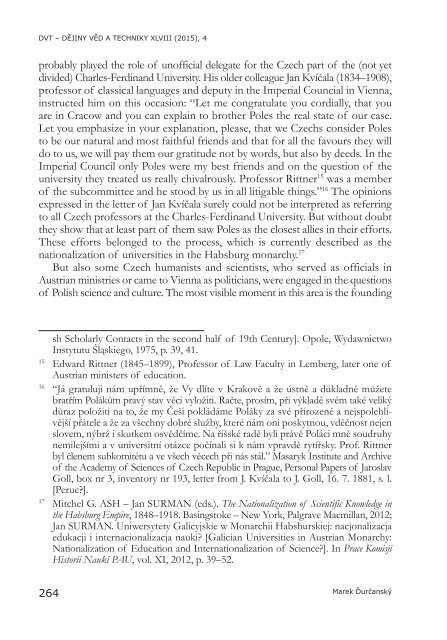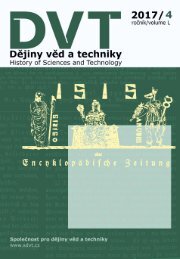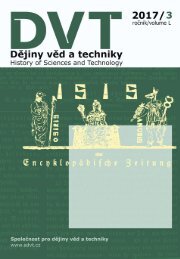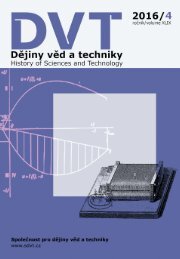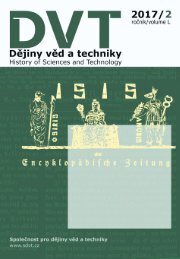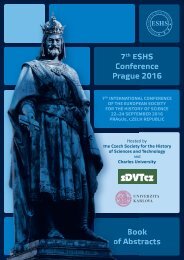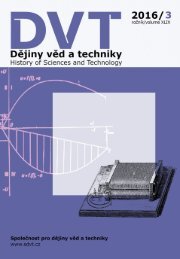Dějiny věd a techniky 2015, 4
Číslo je věnováno 7. mezinárodní konferenci Evropské společnosti pro dějiny vědy, která se konala 22.–24. září 2016 v Praze.
Číslo je věnováno 7. mezinárodní konferenci Evropské společnosti pro dějiny vědy, která se konala 22.–24. září 2016 v Praze.
Create successful ePaper yourself
Turn your PDF publications into a flip-book with our unique Google optimized e-Paper software.
DVT – DĚJINY VĚD A TECHNIKY XLVIII (<strong>2015</strong>), 4<br />
probably played the role of unofficial delegate for the Czech part of the (not yet<br />
divided) Charles-Ferdinand University. His older colleague Jan Kvíčala (1834–1908),<br />
professor of classical languages and deputy in the Imperial Councial in Vienna,<br />
instructed him on this occasion: “Let me congratulate you cordially, that you<br />
are in Cracow and you can explain to brother Poles the real state of our case.<br />
Let you emphasize in your explanation, please, that we Czechs consider Poles<br />
to be our natural and most faithful friends and that for all the favours they will<br />
do to us, we will pay them our gratitude not by words, but also by deeds. In the<br />
Imperial Council only Poles were my best friends and on the question of the<br />
university they treated us really chivalrously. Professor Rittner 15 was a member<br />
of the subcommittee and he stood by us in all litigable things.” 16 The opinions<br />
expressed in the letter of Jan Kvíčala surely could not be interpreted as referring<br />
to all Czech professors at the Charles-Ferdinand University. But without doubt<br />
they show that at least part of them saw Poles as the closest allies in their efforts.<br />
These efforts belonged to the process, which is currently described as the<br />
nationalization of universities in the Habsburg monarchy. 17<br />
But also some Czech humanists and scientists, who served as officials in<br />
Austrian ministries or came to Vienna as politicians, were engaged in the questions<br />
of Polish science and culture. The most visible moment in this area is the founding<br />
sh Scholarly Contacts in the second half of 19th Century]. Opole, Wydawnictwo<br />
Instytutu Śląskiego, 1975, p. 39, 41.<br />
15<br />
Edward Rittner (1845–1899), Professor of Law Faculty in Lemberg, later one of<br />
Austrian ministers of education.<br />
16<br />
“Já gratuluji nám upřímně, že Vy dlíte v Krakově a že ústně a důkladně můžete<br />
bratřím Polákům pravý stav věci vyložiti. Račte, prosím, při výkladě svém také veliký<br />
důraz položiti na to, že my Češi pokládáme Poláky za své přirozené a nejspolehlivější<br />
přátele a že za všechny dobré služby, které nám oni poskytnou, vděčnost nejen<br />
slovem, nýbrž i skutkem os<strong>věd</strong>číme. Na říšské radě byli právě Poláci mně soudruhy<br />
nemilejšími a v universitní otázce počínali si k nám vpravdě rytířsky. Prof. Rittner<br />
byl členem subkomitétu a ve všech věcech při nás stál.” Masaryk Institute and Archive<br />
of the Academy of Sciences of Czech Republic in Prague, Personal Papers of Jaroslav<br />
Goll, box nr 3, inventory nr 193, letter from J. Kvíčala to J. Goll, 16. 7. 1881, s. l.<br />
[Peruc?].<br />
17<br />
Mitchel G. ASH – Jan SURMAN (eds.). The Nationalization of Scientific Knowledge in<br />
the Habsburg Empire, 1848–1918. Basingstoke – New York, Palgrave Macmillan, 2012;<br />
Jan SURMAN. Uniwersytety Galicyjskie w Monarchii Habsburskiej: nacjonalizacja<br />
edukacji i internacionalizacja nauki? [Galician Universities in Austrian Monarchy:<br />
Nationalization of Education and Internationalization of Science?]. In Prace Komisji<br />
Historii Nauki PAU, vol. XI, 2012, p. 39–52.<br />
264<br />
Marek Ďurčanský


